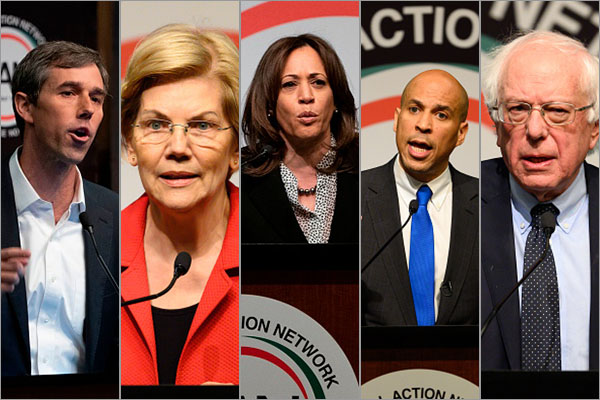Election 2020: Mayor Pete's Douglass Plan Released For Black America
Unpacking Mayor Pete’s ‘Douglass Plan’ For Black America
Some of the highest-polling presidential candidates have struggled to stay on-message as their campaigns try to control the damage being inflicted by political opponents.
That was certainly true for former Vice President Joe Biden, who was still reeling from his sharp exchange on race with Kamala Harris at a Democratic debate late last month. But that was also the case for Mayor Pete Buttigieg of South Bend, Indiana, where his police force on June 16 shot and killed Eric Logan, a Black man, under suspicious circumstances.
That could help explain the timing behind Buttigieg releasing his new plan for Black America on Thursday. “The Douglass Plan” — named after legendary abolitionist Frederick Douglass whose name takes on additional significance every year around the Fourth of July because of a famous speech in 1852 that explained why Black people had no business celebrating America’s independence — was billed as “a comprehensive investment in empowering Black America” and came across as the mayor’s most significant presidential proposals yet.
And while the plan is chock full of ambitious proposals, it was unclear how realistic they were. At the same time, they seemed to go a step beyond the plans offered by some of his fellow Democratic presidential hopefuls and insisted that “by achieving greater equity for Black Americans we lay the groundwork for achieving greater equity for other people of color as well.”
And while Black voters have been gravitating most to Biden, Harris and Elizabeth Warren, a closer look at the Douglass Plan could end up changing that dynamic. Who that change would benefit has yet to be seen, but the following five takeaways from the Douglass Plan could thrust Buttigieg’s candidacy among the frontrunners in this young campaign season.
1. Police reform
Buttigieg said he wants to change how law enforcement reacts following what’s become a seemingly never-ending string of police shooting unarmed Black people. Since the mayor has been called out by the Black community in South Bend, where Buttigieg also fired the city’s first Black police chief under a cloud of controversy, it was only natural he highlight police reform in the Douglass Plan, which was proposing “[s]tricter policies regarding use of force correlate with fewer deaths at the hands of police” and promoting “policies and training that require de-escalation efforts and limit lethal force to circumstances when it is absolutely necessary.”
2. He’d make D.C. a state
“If it were a state, Washington, D.C. would have the highest proportion of Black citizens–approximately 50%–of any state,” the Douglass Plan stated about the nation’s capital that has long been known as Chocolate City. “Indeed, it would be the only state in the union where Black Americans were not a racial minority.”
3. Criminal justice reform
The Douglass plan would also “eliminate mandatory minimum sentence” that have historically been shown to disproportionately affect Black people, who are arrested at an elevated rate for violations that many times don’t result in any charges, let alone convictions, for their white counterparts guilty of the same crimes.
“The average sentence length for someone subject to a mandatory minimum penalty that year was 138 months, compared to 28 months as the average sentence of people convicted of an offense that did not have a mandatory minimum sentence,” the Douglass Plan accurately states.
4. Voter reform
Buttigieg’s plan would “restore the right to vote for all formerly incarcerated people immediately upon release from confinement,” no questions asked. As it stands now, there is no applicable uniform federal law, leaving it up to states to make it easier — or, in Florida’s case, harder — for former felons to legally cast ballots. The plan also references “gerrymandered legislative districts” that have typically stifled Black votes as well as moving to simplify the voter registration process. In relation to granting D.C. its own statehood, the Douglass Plan stated that doing so “would eliminate the possibility of an Electoral College tie, which at present would allow Congress to decide the winner of a presidential election regardless of the popular vote.”
5. Closing the racial wealth gap
Every candidate is talking about the racial wealth gap, but the Douglass Plan specifically addresses Black homeownership as a way to help narrow the growing financial chasm. In all truthfulness, Harris and Warren also have comprehensive plans promoting Black homeownership as a way to generate wealth, the fact that Buttigieg has at least addressed the topic in a meaningful way — “Equalizing homeownership rates amongst races would reduce the racial wealth gap between white and Black families by 31%,” the plan says — could end up going a long way for him.
SEE ALSO:
Police Try To Defend Arresting A Black Man With A Baby In His Arms
Metro Transit Insists White Driver Didn’t ‘Intentionally Mow Down’ Black People At Bus Stop
















